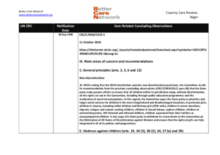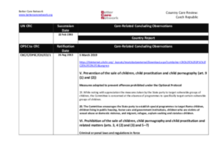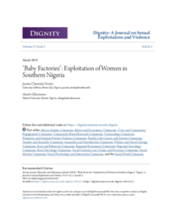Displaying 211 - 220 of 660
This country care review includes the care related Concluding Observations adopted by the Committee on the Rights of the Child and the Committee on the Rights of Persons with Disabilities as part of its examination of Niger's initial reports, as well as other care-related concluding observations, ratification dates, and links to the Universal Periodic Review.
Empirical research with social workers exploring their understandings and use of codes or ethical theories in practice remain underdeveloped in the UK. This article, based on the British Association of Social Work commissioned Enquiry into the role of the social worker in adoption with a focus on ethics and human rights, provides an important contribution in this context.
This country care review includes the care-related Concluding Observations adopted by the Committee on the Rights of the Child and the Committee on the Rights of Persons with Disabilities.
The first aim of this study was to find subgroups of adult international adoptees based on common risk and protective factors using a latent class analysis. The second aim was to examine whether the identified subgroups differed in outcome variables such as life satisfaction and psychological adjustment.
This paper draws on an evaluation of the effectiveness of the Nurturing Attachments groupwork programme provided by AdoptionPlus for adoptive families in England. The Nurturing Attachments programme, informed by Dyadic Developmental Psychotherapy (Hughes, Golding & Hudson, 2015), was developed to help foster and adoptive parents strengthen their relationships with the child and support children who had experienced developmental traumas.
This country care review includes the care-related Concluding Observations adopted by the Committee on the Rights of the Child and the Committee on the Rights of Persons with Disabilities. The Committees' recommendations on the issues relevant to children's care are highlighted, as well as other care-related concluding observations, ratification dates, and links to the Universal Periodic Review and Hague Intercountry Adoption Country Profile.
Using qualitative methods of data collection, factors influencing child placement in Southwestern Nigeria were examined in this article.
This paper examines the development and proliferation of baby-selling centers in southern Nigeria and its impacts on and implication for women in Nigeria. It demonstrates how an attempt to give protection to unwed pregnant girls has metamorphosed into “baby harvesting” and selling through the notorious “baby factories,” where young women are held captive and used like industrial machines for baby production.
This country care review includes the care related Concluding Observations adopted by the Committee on the Rights of the Child as part of its examination of Guinea’s periodic report to the Convention on the Rights of the Child.
This chapter identifies the structural components of the transnational illegal adoption market by applying the basic logic of the routine activity theory that has been developed by Cohen and Felson.





